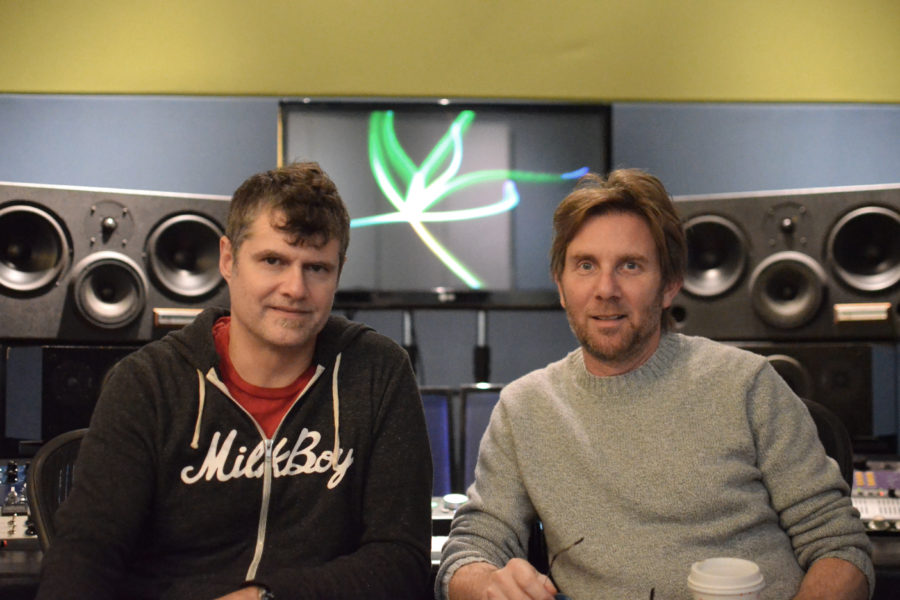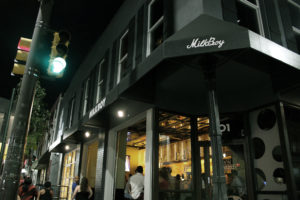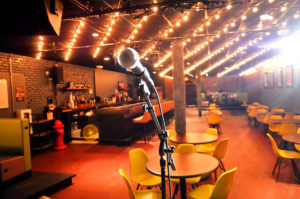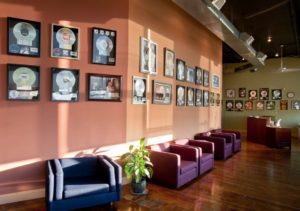
MilkBoy owners Tommy Joyner (L) and Jamie Lokoff
A Philadelphia Story
Like all great Philadelphia stories, this one starts with a couple of underdogs, more than a few maxed-out credit cards and the kind of indomitable passion for music and the arts most financial advisors would sternly warn against. It’s been two decades since MilkBoy owners Tommy Joyner and Jamie Lokoff transformed a scrappy music studio on the second floor of a family music store to a nationally respected Philadelphia recording studio, restaurant, bar, cafe and live music venue. MilkBoy has become somewhat synonymous with the Philadelphia music scene, as it’s impossible to be aware of one without being aware of the other. Having recorded artists such as Miley Cyrus, Meek Mill, Dave Matthews, The Roots, and countless others, MilkBoy has earned the title of being Philadelphia’s most recognizable and accomplished studio to date.
But MilkBoy is more than just a recording studio; MilkBoy is a bona fide Philadelphia empire. Foodies and music-lovers might already be aware of their two eponymous (and rather successful) restaurants that expertly blur the lines between gastropub and live music venue, one located in Center City, the other on South Street. Audiophiles will appreciate MilkBoy’s foray into the world of sound design in the form of SHAKE Audio Post—an award-winning sound design studio that has worked with various media companies, including ESPN, NBC Universal, NPR, Nat Geo, Golf Channel, as well as just about every major media agency across Philadelphia and New York. And just when you think MilkBoy couldn’t possibly pick a more difficult industry in which to succeed, they defy your assumption with two (half) words: rom-com. In 2015, Joyner and Lokoff co-produced the Center City-based romantic comedy Slow Learners under the banner of MilkBoy Entertainment, an offshoot of MilkBoy Studio, starring Adam Pally (The Mindy Project), Sarah Burns (Enlightened), and Kate Flannery (The Office), as well as Kevin Dunn and Reid Scott (Veep). The film premiered at the Tribeca Film Festival in 2015 and is still available via iTunes, YouTube, Amazon Prime, and Google Play.

So how did two young upstarts build a second-floor music studio into one of Philadelphia’s most thriving enterprises? According to Joyner, quite slowly at first, considering MilkBoy’s first major milestone was upgrading from a four-track cassette recorder to a digital eight-track. “I just wanted a place to record my own band,” recalled Joyner, leaning against a high table amid the bustling after-work patrons of MilkBoy’s Center City bar and restaurant. “I was doing that in my basement in New York. A friend of a friend was a Philly guy and was like, ‘You know, my parents would probably give us the second floor of the music store rent-free. We should do this for real, make a business of it.’”

Doing just that, Joyner relocated to Philadelphia in 1994 and opened a small recording studio and music label where he recorded local bands and released a few full-length albums and compilation CDs. It wasn’t until 1999, when Joyner met his long-time business partner Jamie Lokoff, that things really began to take off. “[Lokoff] is a composer and musician and had been hired to write a jingle for a toy. So he hired the studio—me—to work on it with him,” said Joyner. “[Lokoff] approached me later and said, ‘You’re doing this all by yourself, would you like some help?’ And I said yeah. So we worked out a deal for him to become my partner at the studio, and it’s been that way ever since.”
“I went to school for theater, not at all for music,” said Lokoff, as he sat comfortably in a recliner in the expansive, well-decorated lobby of MilkBoy Studio (think “man-cave” for those with minimalist taste and an impeccable eye for detail). Around him, dozens of gold and platinum records line the studio walls, the Philadelphia skyline dominating the giant windows as if to underscore the role MilkBoy plays in Philadelphia’s music and entertainment culture and vice-versa. The lighting: perfectly warm and dim. An Xbox sits in the corner attached to a flat screen for hanging out and relaxing between recording sessions.
“I lived with a couple of music majors,” recalled Lokoff, discussing his background. “This was right around the time the four-track came out. At the time, you couldn’t multi-track in your home unless you had so, so much money. One of my roommates got one of the first editions of that. He played me something he recorded. He was harmonizing, it had multiple guitars…I was so blown away by it, so hooked. After that, all I wanted to do was write songs.”
Like all great and powerful empires before them, MilkBoy’s earliest challenge was also the oldest and most obvious. “Always money,” Joyner said. “We did that thing where you max out a credit card and then, once your introductory APR is up, you flip that over to another card. And then you break out another card and buy something else. Running a studio is very capital-intensive. You’re always chasing technology. You always have to keep up with that and spend, spend, spend.”
In 2002, Joyner and Lokoff opened their second recording studio in Ardmore, PA. Lokoff partly credits MilkBoy’s success to their willingness to think outside of the box and diversify amid the file-sharing, Napster-ized music recording culture of the early-to-mid 2000s. “The music industry was changing,” said Lokoff. “Home recording was becoming so cheap. Record companies were losing money and weren’t spending as much money, and the studio business was getting tougher and tougher. So we wanted to diversify.

“At the time, we had some interns—a couple of high school kids—they decided to do an open mic promotion at a coffee shop [in Wayne, PA]. We said that we’d give them studio time as the winning prize, and there was a line of kids around the block wanting to perform.
“Somebody once came to us and said ‘MilkBoy is like the only cool thing to do in Ardmore, what do you think we have to do to bring the youth back?’ And we pointed to that. You know, why do we have to go to Wayne to do something like that? And that was the sort of impetus of the idea. Just on a whim, we started writing a business plan for a coffee shop that would become a music venue. I guess it was meant to be because we somehow found the money to create that, and that’s how this whole thing started.”
It was this rough business plan that would eventually become MilkBoy Coffee, a boutique coffee shop and live music venue opened in 2006, right around the corner from their Ardmore recording studio. Lokoff also credits the popularization of social media platforms such as Facebook and Twitter as being a major marketing engine for MilkBoy at that time. “All of a sudden, everybody was posting on social media ‘I’m playing at MilkBoy, I’m doing this at MilkBoy, I’m doing that at MilkBoy,’” Lokoff said. “It certainly got the MilkBoy name out into the public much more than just the studio did.”
From those humble coffee shop roots, the MilkBoy every Philadelphian has come to know and love was truly born. In 2011, MilkBoy Coffee traded in their coffee beans for a liquor license and moved location to Center City (under the simplified name MilkBoy), opening their first bar and restaurant on Chestnut Street, right across the street from Thomas Jefferson University Hospital, where they discovered a previously untapped market: third-shifters. “We do a seven-to-ten happy hour for the people getting off the overnight shift at Jefferson,” said Chris Beyer, Director of Operations. An ingenious and lucrative revenue stream, to say the very least. As Beyers laughingly pointed out, “We crush it, man.”
Shortly afterward, in 2012, Joyner and Lokoff purchased their current North 7th Street studio location from legendary producer and arranger Larry Gold. “It was originally called ‘The Studio’ and was primarily known for its string arrangements,” explained Beyer. “Larry had been operating out of there for years. We kind of partnered with Larry and breathed a little bit of new life into the studio. Larry is sort of pseudo-retired right now. He keeps on saying I can have his office, but he’s there every day!”
Since then, MilkBoy has done nothing less than dominate the local music, entertainment, and hospitality scene, becoming as synonymous with Philadelphia as Rocky Balboa, cheesesteaks, and whatever the hell Gritty is. They’ve worked with countless national recording artists and have successfully branched out into other industries more adeptly than any of their peers, something Joyner partially attributes to Philadelphia itself. “Philadelphia is an incredibly musical place,” said Joyner, reflecting on the city. “It seems like music is in the water here.”
“To me, we wouldn’t be anywhere if it weren’t for Philadelphia,” Joyner continued. “I don’t think this could have been successful in any other place. Opening a popular bar in the middle of a big city was an amazing thing for us to do. And we’ve paid so many dues to do it. We struggled. It’s been a very long, slow build. And I don’t know if you could have a long, slow build in another city. Philadelphia is forgiving that way.”
“Now the biggest challenge is staying interesting and being relevant,” said Joyner, quite humbly. “Staying on top of what’s important to Philadelphia. To get people to come to a place that’s been here for a little while and staying in the conversation.”

